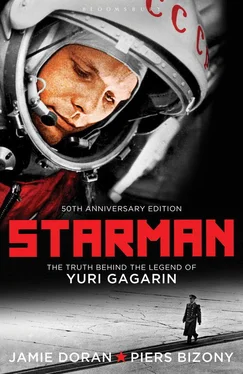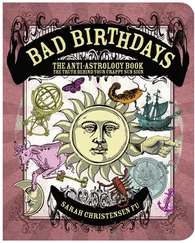Proudly the boys handed out the tubes of space food they had found. ‘Some of us were lucky and got chocolate,’ Tatiana recalls. ‘The others got mashed potatoes. I remember tasting some and spitting it out.’
Tamara says, dismissively, ‘If you offered it to us today, we wouldn’t eat it.’
By now the children (and a good many adults besides) were clambering in and around the ball looking for souvenirs. The military security squad had arrived, though not yet in sufficient numbers. According to Tamara, ‘They tried to scare us off. “Go away, go away!” they said. “It could explode!” Their threats didn’t have the slightest effect on us.’
Actually there were several opportunities for citizens of the Saratov region to collect souvenirs. Gagarin had cut loose from his parachute the moment he landed, because he was slightly worried that the wind might drag him off his feet. That parachute went missing soon afterwards, while the ball’s larger canopy was shredded by souvenir-hunters. The cabin’s heavy hatch came down somewhere, as did a detachable radio transceiver and other items of survival gear, and the second hatch covering the ball’s parachute compartment.
All these components had some interesting adventures before they were recovered. For instance, there was the matter of the raft. If the ball had come down over the sea, Gagarin might have stayed with it until splashdown, because the impact on water would have been less severe than on the ground; but the ball was not guaranteed to stay afloat for an indefinite time, so he would have clambered with all due haste into an inflatable life-raft. In the event, he came down over Russia precisely according to plan, and the raft stayed packed inside his survival pack. Apparently someone removed it without authorization, and a day or so later he took it to the nearby Volga tributary to do some fishing. A large detachment of KGB officers arrived in the district and requested that all stolen equipment from the Vostok be surrendered, including the raft. They threatened the entire population of Smelkovka with detention if the missing equipment was not returned immediately. Tractor driver Lysenko remembers a certain degree of fuss about ‘something being torn, or going missing. Perhaps it’s better not to say… Some of our boys, the younger ones, found a boat. The special police came and said, “It belongs to the State. We must have it.” They visited all the houses and put pressure on various people.’
Yaroslav Golovanov adds his contribution to the story. ‘Eventually the KGB recovered their prize, and the unhappy fisherman could only fidget and say, “I’m sorry, but the boat is dilapidated, ripped apart.” The KGB officers wanted to correct the fisherman’s false ideas. “The boat is fine. Nothing has been torn,” they said.’
Apparently the KGB officers did not want to tell their superiors that various historic items from the First Cosmonaut’s equipment had been tampered with, before they could collect them all.
Gagarin’s social responsibilities began the instant his feet touched the ground. The old woman and the little girl needed reassuring that he was not an enemy spy. He really wanted the farm lads from Smelkovka to be rememembered, because they had been so friendly. Now the military was all over the place, and the officer on the scene, Major Gasiev, came up to him. Gagarin saluted smartly and said, ‘Comrade Major! USSR Cosmonaut Senior Lieutenant Gagarin reporting!’
‘Listen, you’re a Major too. Don’t you know? You were promoted during your flight,’ said Gasiev with a big grin. They embraced amicably, officers of equal rank, and of course Gasiev had a hundred questions. [2] Golovanov, Our Gagarin , pp. 150–51.
Then there was the question of the Altitude Record. The sports official Ivan Borisenko needed Gagarin to sign some documents. In a 1978 account Borisenko described ‘dashing up to the descent module, next to which stood a smiling Gagarin’. This seems unlikely because the capsule was at least two kilometres away, and Borisenko must have rendezvoused with the cosmonaut at his separate touchdown site, or else in another field on the outskirts of Smelkovka, where a large helicopter was sitting ready to take Gagarin to the nearby Engels airbase. Some time very soon after his landing, the First Cosmonaut blithely put his signature to a sheaf of Borisenko’s off-white lies. [3] An English-language report, prepared for the International Aeronautics Federation and signed by Gagarin, Borisenko and other officials, featured as Lot 39 in Sotheby’s auction of March 16, 1996. Full details of the document can be found in the reference for Lot 39, Sotheby’s Sale Catalogue 6753, Russian Space History , March 16, 1996.
In the helicopter, Gagarin politely and enthusiastically answered all the questions that his military escorts threw at him. What was the earth like? The weightlessness? He was learning that all the questions would be similar, wherever he went. But at one point he went quiet for a moment. According to Golovanov, he said, ‘You know, I never got to see the moon through my porthole… Never mind, I’ll see it next time.’ With that, he brightened up and took more questions.
General Stuchenko, his career resting safe for today, met Gagarin on the tarmac at Engels and immediately posed another complex social challenge for the space traveller, as witnessed by Golovanov. ‘Yuri Alexeyevich, in the battles to liberate the Gzhatsk district, there was only one commander. You must remember me?’
‘No, I don’t.’ This was not such a good reply. Stuchenko looked absolutely crestfallen, and Gagarin had to think fast. ‘I mean, I don’t remember your face. But I remember there was a commander. So that was you? How wonderful! You must be my double godfather. Once you rescued me from the Nazis, and now you’re meeting me on my return from space!’ [4] Golovanov, Our Gagarin , p. 151.
This response proved more satisfactory. Then Stuchenko asked, ‘How would you like it if we sent a plane to Moscow to fetch your wife? Valentina could come here and then you could fly home together.’
Another awkward problem: how to refuse such a kind offer from a superior officer, and a General, no less. ‘Thank you very much for the thought, Comrade General, but I’m afraid it wouldn’t do. Valya’s nursing our newly born daughter at the moment.’
Stuchenko escorted Gagarin into the airbase’s officer’s quarters, where he had an opportunity to call his family and report his success to the First Secretary on a secure phone link. Gagarin spoke carefully, knowing full well that his every word would be written down for posterity. [5] The conversation between Gagarin and Khrushchev was widely reported in the press. A full transcript appeared in the 1961 TASS pamphlet Soviet Man in Space , p. 24.
‘I’m glad to hear your voice, Gagarin Alexeyevich.’
‘Nikita Sergeyevich, I’m glad to report that the first space flight has been successfully completed.’
Khrushchev continued in an official vein for a while, but he could not long resist the ordinary questions. ‘Tell me, how did you feel in flight? What’s space like?’
‘I felt fine. I saw the earth from a great altitude. I could see seas, mountains, big cities, rivers and forests.’
Now, for Khrushchev, the real fun. ‘We shall celebrate together with all the Soviet people. Let the world look on and see what our country is capable of, the things our great people and our Soviet science can do.’
Gagarin dutifully echoed the sentiment. ‘Now let the other countries try and overtake us.’
‘Exactly! Let the capitalist countries try to overtake us!’
According to his senior aide Fyodor Burlatsky, Khrushchev was deeply impressed by Gagarin’s cheerfulness and the enthusiastic nature of all his replies. He genuinely looked forward to seeing the young man in Moscow for a splendid and very public celebration in two days’ time.
Читать дальше












